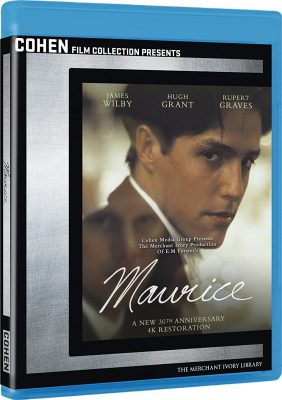
Maurice (pronounced Morris) is a landmark film. Based on E.M. Forster’s novel, it is the first (or one of the first) film to depict a gay love story with a happy ending. It also clearly depicted the attitude toward homosexuals in the Edwardian era – and how courageous it would have been to be oneself in those days. If that was all Maurice did, that would be enough, but it’s also a very, very good film.
As part of the Chen Film Collection, Maurice gets a classy package with some excellent bonus material.
Set prior to World War I, Maurice begins with the introduction of Maurice (James Wilby) and Clive Durham) as part of a group of students at Cambridge, where Risley (Mark Tandy), a fellow student, attempts to engage the group in a philosophical debate they are just not that into.
Over the next while, Maurice and Clive become the best of friends – until, one day, they realize that they are more than that. The ensuing scenes show a couple in love – ditching classes, going to the country, riding down a river in a punt and generally being giddy with this strange new emotional experience that flouts convention.
According to convention, Western civilization – according to their instructors – is built upon the tenets espoused by classical Athenian society (but ‘omit the unspeakable vice of the Athenians’) and Christianity. These professors – and university’s Dean (Barry Foster) – are dry as dust and hardly convincing.
Things change when Risley is arrested on and ‘immorality charge’- and Clive decides to hide his nature, marry a nice girl and go into politics. Which leaves Maurice shattered – though circumstances lead to something new and potentially lasting.
Unlike the other films in Merchant Ivory’s E, M. Forster Trilogy (Room with a View, Maurice and Remains of the Day), director James Ivory (who co-wrote the screenplay with Kit Heskith-Harvey) not only emphasized getting the period exactly right (a trait THAT MAKES Merchant Ivory films such a visual delight), he insisted on a cooler palette to emphasize the sense of oppression that English homosexuals lived under.
At 140 minutes, Maurice moves at the same kind of stately pace as the other films in the trilogy – which allows us to get to know the key characters really well. Knowing them as people, rather than, types, we are carried along with their lives and love.
We sympathize with Clive’s beard – wife Anna (Phoebe Nicolls), who has no idea that that’s the case while feeling horrified by Maurice’s attempts to reconcile his nature with Edwardian mores by visiting a hypnotherapist (Ben Kingsley).
Likewise, we can’t help but laugh, sadly, when Maurice asks if England will ever stop seeing homosexuals as an abomination and the therapist replies, ‘England has always been disinclined to accept human nature.’
Undoing Maurice’s treatments, a new fellow, Alec Scudder (Rupert Graves) unintentionally forces Maurice to decide whether or not to accept his nature and leads the film to its unique (at the time) conclusion.
Under Ivory’s director and with gorgeous (if muted) cinematography by Pierre Lhomme – Ivory wanted his classic English settings shot by someone who would them from a different perspective – Maurice is a beautiful looking film, too.
Maurice is a milestone film for its content – few films had so much by simply telling a story well. Released at the height of the AIDS epidemic, the film no doubt had an influence on the way gays were seen and treated, showing as it did that they were just human beings and not monsters.
The Cohen Film Collection Blu-ray contains several excellent bonus features – five featurettes: James Ivory and Pierre Lhomme on the Making of Maurice; New On Stage Q&A with James Ivory and Pierre Lhomme; New conversation between James Ivory and Spotlight director Tom McCarthy; The Story of Maurice; Conversation with the Filmmakers; Deleted Scenes with Commentary by James Ivory, and a 20-page booklet containing a list of key cast and crew; an introduction by James Ivory; a lengthy interview with James Whitby, and an essay on the film by John Pym.
Grade: Maurice – A
Grade: Features – A
Final Grade: A